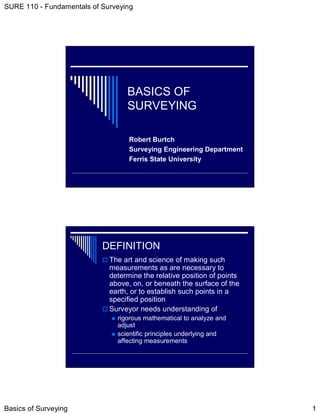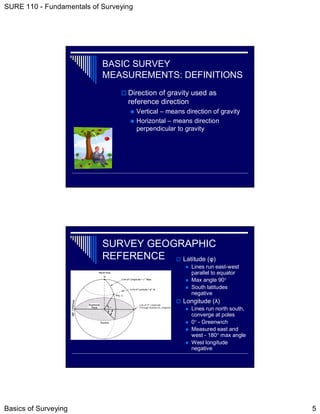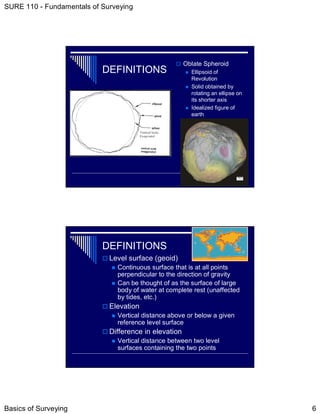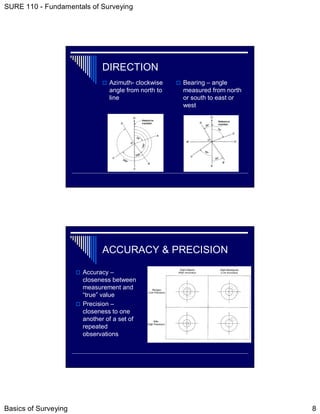Basics of surveying
- 1. SURE 110 - Fundamentals of Surveying BASICS OF SURVEYING Robert Burtch Surveying Engineering Department Ferris State University DEFINITION The art and science of making such measurements as are necessary to determine the relative position of points above, on, or beneath the surface of the earth, or to establish such points in a specified position Surveyor needs understanding of rigorous mathematical to analyze and adjust scientific principles underlying and affecting measurements Basics of Surveying 1
- 2. SURE 110 - Fundamentals of Surveying BRANCHES OF SURVEYING Geodetic Surveying Plane Surveying Branch of surveying Branch of surveying in which account is in which the surface taken of figure and of the earth is size of earth considered a plane surface PHASES OF SURVEYING Field Work Data procurement phase Office Work â data are Analyzed Reduced to useful form by mathematical calculations Adjusted Frequently converted to graphical mode of expression Basics of Surveying 2
- 3. SURE 110 - Fundamentals of Surveying KINDS OF SURVEYS Property surveys Determine boundary lines, location of property corners, acquisition of data to prepare land subdivisions Route surveys Designing and constructing engineering projects associated with transportation and communications Industrial surveys Surveys in aircraft and other industries where accurate dimensional layouts necessary KINDS OF SURVEYS Topographic surveys Collect field data to prepare topographic maps Hydrographic surveys Map shorelines of water bodies, chart bottom areas of streams, lakes, harbors, etc., measure flow of rivers, assess other issues related to navigation and water resources Aerial surveys (photogrammetry) Use photographs mounted in specially designed planes Basics of Surveying 3
- 4. SURE 110 - Fundamentals of Surveying KINDS OF SURVEYS Mine surveys Determine position of underground works and surface mines, fix position and direction of tunnels and shafts, define surface boundaries Construction surveys Performed during building of structure or project to fix elevations, horizontal position, and dimensions Control surveys Provide basic horizontal and vertical position data for engineering mission KINDS OF SURVEYS Final (âAs Builtâ) survey Tie in features that have just been constructed to provide final record of construction and to check that construction has proceeded according to design plan Basics of Surveying 4
- 5. SURE 110 - Fundamentals of Surveying BASIC SURVEY MEASUREMENTS: DEFINITIONS Direction of gravity used as reference direction Vertical â means direction of gravity Horizontal â means direction perpendicular to gravity SURVEY GEOGRAPHIC REFERENCE Latitude (Ï) Lines run east-west parallel to equator Max angle 90° South latitudes negative Longitude (Îŧ) Lines run north south, converge at poles 0° - Greenwich Measured east and west - 180° max angle West longitude negative Basics of Surveying 5
- 6. SURE 110 - Fundamentals of Surveying Oblate Spheroid DEFINITIONS Ellipsoid of Revolution Solid obtained by rotating an ellipse on its shorter axis Idealized figure of earth DEFINITIONS Level surface (geoid) Continuous surface that is at all points perpendicular to the direction of gravity Can be thought of as the surface of large body of water at complete rest (unaffected by tides, etc.) Elevation Vertical distance above or below a given reference level surface Difference in elevation Vertical distance between two level surfaces containing the two points Basics of Surveying 6
- 7. SURE 110 - Fundamentals of Surveying Vertical line DEFINITIONS Line following direction of gravity Vertical line passing through several different points on surface of earth do not intersect at a common point Vertical lines not necessarily normal to surface of the earth Deflection of vertical Angle between perpendicular to geoid and ellipsoid DEFINITIONS Horizontal line Line perpendicular to vertical line at a point Horizontal plane Plane perpendicular to vertical line at point Only 1 horizontal plane through a given point Vertical plane Plane containing vertical line at the point Infinite number of vertical planes as a given point Basics of Surveying 7
- 8. SURE 110 - Fundamentals of Surveying DIRECTION Azimuth- clockwise Bearing â angle angle from north to measured from north line or south to east or west ACCURACY & PRECISION Accuracy â closeness between measurement and âtrueâ value Precision â closeness to one another of a set of repeated observations Basics of Surveying 8
- 9. SURE 110 - Fundamentals of Surveying ERRORS No measurement free of error (except counting) Mistakes or blunders Not really errors because they are usually so gross in magnitude Most common reason â carelessness Must be discovered and eliminated ERRORS Systematic error Occur according to a system which can be expressed mathematically Magnitude and sign can be determined Follow definite pattern Can be caused by observer, instrument, environment Random error Error left after systematic error removed May tend to cancel themselves Basics of Surveying 9
- 10. SURE 110 - Fundamentals of Surveying UNITS OF LENGTH Imperial units SI units (meters) (feet) Le Systeme Usually Internationale dâUnites subdivided into (International System decimal units in of Units surveying Normally subdivided Use of inches into decimeter, centimeter, millimeter NORMAL PREFIXES FOR METER deci (d) 10-1 exa (E) 1018 centi (c) 10-2 peta (p) 1015 milli (m) 10-3 tera (t) 1012 micro (Âĩ)10-6 giga (g) 109 nana (n) 10-9 mega (m) 106 pico (p) 10-12 kilo (k) 103 femto (f) 10-15 hecto (h) 102 atto (a) 10-18 deka (da) 101 Ex: kilometer = 1,000m Ex: millimeter = 0.001m Basics of Surveying 10
- 11. SURE 110 - Fundamentals of Surveying METRIC SYSTEM 1791 French Academy of Sciences recommended metre to be 1/10,000,000th part of polar quadrant passing through Paris 1799 Academy of Sciences developed new standard â Metre of the Archives â made of platinum 1 meter in length 1999 General Conference of Weights and Measures adopts âInternational Prototype Metreâ â platinum & iridium bar METRIC SYSTEM 1960 National Prototype Meter â 1,650,763.73 wavelengths of Krypton 86 atom in a vacuum 1983 Conference Generale des Poids et Mesures redefined meter as length of the path traveled by light in a vacuum during a time interval of 1/299792458 of a second Basics of Surveying 11
- 12. SURE 110 - Fundamentals of Surveying FEET-METER CONVERSION FEET-METER CONVERSION Ferdinand Hassler brought iron meter bar to U.S. in 1805 for work with Coast Survey 1866 Congress legalized use of metric system 1893 â Mendenhall Order Superintendent of Weight & Measures 1 meter = 39.37 inches (exact) 1 U.S. Yard = (3600/3927) meter (exact) Basics of Surveying 12
- 13. SURE 110 - Fundamentals of Surveying FEET-METER CONVERSION 1959 U.S. & U.K. agreed that Imperial units used in both countries should be the same Defined 1 Yard = 0.9144 metre (exact) 1 ft = 0.3048 m (exact) 1 inch = 25.4 mm (exact) Did not change relationship established by Congress â kept for surveying and called U.S. Survey foot Basics of Surveying 13












